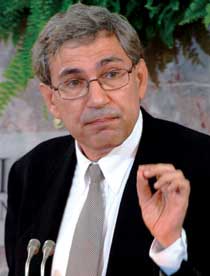STOCKHOLM, 13 October 2006 — Novelist Orhan Pamuk, whose prosecution for “insulting Turkishness” raised concerns about suppression of free speech in Turkey, won the Nobel literature prize yesterday for his works that focus on the symbols of clashing cultures.
The Swedish Academy’s decision honored a writer whose attempts to bridge Turkey’s past with a future tied to Europe and the West has resulted in trials and condemnations on grounds of “insulting Turkishness.”
Pamuk, an incendiary social commentator, has been roundly supported by the West and writers for taking a stand in ensuring that the killing of scores of Armenians during and after World War I at the hands of Turkey be known.
He was charged last year and faced the threat of prison for telling a Swiss newspaper in February 2005 that his homeland was unwilling to deal with two of the most painful episodes in recent Turkish history: the massacre of Armenians during World War I, which Turkey insists was not a planned genocide, and recent guerrilla fighting in Turkey’s overwhelmingly Kurdish southeast.
The award was the third consecutive year that the Swedish Academy has honored a writer who has criticized their home country, both in print, and in public. Last year’s winner, Briton Harold Pinter called for Prime Minister Tony Blair to be impeached, while the 2004 winner, Austrian Elfriede Jelinek, criticized the treatment of women in her country. Kemal Kerincsiz, who leads a group of ultra-nationalist lawyers that helped bring the charges against Pamuk, said he was ashamed Pamuk had been honored with a Nobel.
“I don’t believe this prize was given for his books or for his literary identity,” Kerincsiz said.
“It was given because he belittled our national values, for his recognition of the genocide. The prize that was given was not a source of pride. As a Turkish citizen I am ashamed,” he said.
Horace Engdahl, the head of the Swedish Academy, which has decided the winner of every literature prize since 1901, said the selection of Pamuk was not influenced by his political squabbles in Turkey.
“It could of course lead to some political turbulence but we are not interested in that,” Engdahl said. “He is a controversial person in his own country, but on the other hand so are almost all of our prize winners.”
He said Pamuk was selected because he had “enlarged the roots of the contemporary novel” through his links to both Western and Eastern culture. “This means that he has stolen the novel, one can say, from us Westerners and has transformed it to something different from what we have ever seen before,” Engdahl said.
“His roots in two cultures... allows him to take our own image and reflect it in a partially unknown and partially recognizable image, and it is incredibly fascinating.”
Pamuk has long been considered a contender for the Nobel prize and he figured high among pundits and bookmakers. His works, written in Turkish, have been translated into languages including English, French, Swedish and German.










